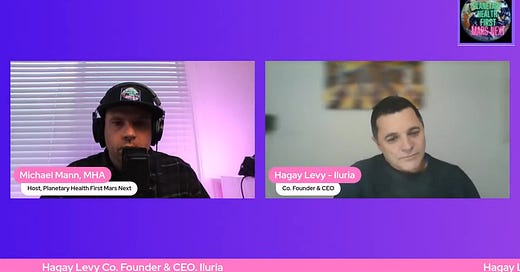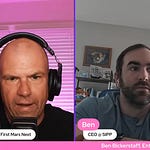Quick Pulses of Full Conversation: Tachyons, Soundbites, Takeaways..
Haggai Levy's Personal Connection to ADHD
Awesome. Welcome to Planetary Health First, Mars Next. My name is Michael Mann. I'm the host, and we have Haggai here. And I am super excited because you're really working on a hugely important thing that impacts not only children, but adults as well. Could you introduce yourself real quick before we get going in our conversation? Of course. So thank you for having me. It's a real pleasure, Haggai Levy. Born and raised in Israel, 55 years old. Most of my background is actually business, capital markets, a major in finance, investment banking, many, many years in the high-tech industry and multiple verticals in multiple C-level positions. The element that actually led me to Elluria, aside from the business potential, is actually the personal aspect. First of all, I have ADHD myself. But again, I just turned 55, so in my generation, who the hell knew? We had to scratch away from everything, hoping to end up on the bright side of the moon, not on the dark side of the moon. But now the awareness is totally different. I'm a father, four kids. As of this morning, all four of them were diagnosed with ADHD with and without hyperactivity.
Pharma's Enduring Role in ADHD Treatment
With respect to, let's say, replace the pharma, and again, I'm not an advocate for pharma players, I can just say what I see. For many years, there were many, many attempts to either replace the pharma or complete the pharma, neurofeedback, biofeedback, I guess some of the audience heard of Akili Interactive that created, it made a lot of noise, like this video game that reduces the symptoms. Practically, the pharma is there and will be here for, I don't know, at least, again, I'm not an advocate for pharma, I'm just trying to look at the industry. for at least, at least, at least the next 20 years, at least.
ADHD: Disorder or Attribute?
So technically, and again, I'm not a physician. I'm just a father with some finance expertise. But technically, again, I'm slightly simplifying it, but technically it's a chronic disorder. I mean, it's lack of dopamine at the end of the day in the brain. So the nervous system is like slightly open. It's like seeing many, many televisions all at once without actually being able to complete specific show. So technically, this is what it is. I truly see it as an attribute because, again, As I mentioned, I think previously in the green room or now, if you look at adults with ADHD, you will barely see in the middle, but you will even see people that actually utilize it or utilizing this attribute.
Insights into Clinical Trials and Substance Misuse
Again, as I mentioned, we're halfway through a clinical trial, specifically with young adults. It's a whole different problem. I mean, clinically, it's the same problem, value proposition-wise. There is a huge problem in misusing stimulus in colleges and universities, overdosing in some cases. So we do believe that we will have another offering for that ecosystem and also the non-pharmacological treatment. I mentioned the food supplement we started measuring. And last but not least, looking at the IP, so we have a patent for anxiety and depression and we have another patent for, sorry, for ADHD and we have another patent for anxiety and depression, we do want to be engaged in that as well.
Advice for Parents on ADHD Treatment
first of all i i i would uh be a bit cautious in the state recommend because i'm not a physician right such as all of the other ones yeah but if i may quote my wife actually It's her quote, as I mentioned, the compliance to treatment is super, super, super low. I mean, ultimately it's like 25%. Then again, if you look at statistics, like meta researchers showing the lifelong implications of actually properly treating ADGT patients or not, you will see severe differences between the properly treated, learning to leverage this attribute, and the none. So again, just quoting my wife again, I think that my main personal recommendation is not to avoid the decision. Again, I'm not saying use pharma or not, but avoiding the problem which is statistically, this is what parents will do, avoiding the problem. It's not solving it. It's ignoring it. And again, it might erupt in the future. Again, I don't know if the audience know, but there was a lot of comorbidity with anxiety and depression for obvious reasons. If it's not treated, then it starts to grow on you and some self-confidence and so on and so forth.
Budget Respect and Risk Mitigation
I think that the main focus is to be respectful of the budget at the end of the day. And again, it's okay to, again, not defocus, but mitigate the risk via several activities, but as long as the risk and the financial element is mitigated.
Major Challenges in Iluria's Entrepreneurial Journey
And what have you found the most difficult thing so far in your journey? Did you say six years in or seven years in of this entrepreneurial with you and your wife and now you have, of course, a team? Yeah, so practically it's like three years because we did the initial measurements. We're just trying to evaluate whether we can actually improve the situation for our kids. And then we took a couple of years during COVID, did a clinical trial. uh on our experience in a sense just trying to see whether we can actually make it a bit more generic uh so practically we've been working for like three years i i would say that there are two major challenges funding is always a challenge for early stage startups doesn't matter which industry or uh uh so this is pretty much generic i i i would dare to say that the second element which we are not i don't want to say bother but we are devoting a lot of resources trying to illuminate the ecosystem is again the go-to market just echoing on your previous question because again the u.s market is huge slightly fragmented. There are multiple stakeholders. You have special education. You have self-assured employers. Again, you mentioned the payers. We need to better figure out the motivation of the payers, whether it's relevant or not. So again, huge, fragmented. And I think this is, aside from the funding, this is the element that we should devote more resources to.
Challenges in Treating Depression with Objective Data
It's yet again the same issue. Everything is subjective. So if depression tells you, I don't feel it's working, either I don't have any concentration or I still feel depressed, it's very hard to know whether it's some sort of a personal issue. Maybe someone is bothering the child or maybe the kid is depressed due to other objective reason or whether it's lack of serotonin or dopamine. So our goal is just, again, providing objective decisions for data. with respect to the impact of the pharma. Not to solve, again, we're not splitting the genome and we're not curing ADHD or anxiety, but we just want to add another layer of objective data with respect to the pharma.
More About Iluria
Find us & follow us:
😍 💕 🌍 💜 😊 🚀Most important thing is to subscribe to keep updated with our latest podcasts, newsletters...etc.
Planetary Health First Mars Next is a reader-supported publication. To receive new posts and support my work, consider becoming a free or paid subscriber.
We might just lift off to Mars if the orbit is right! 😍 💕 🌍 💜 😊 🚀
In love & kindness,
Michael Mann, (😍 💕)
Disclaimer: the views of the participants are their own only and do not reflect the views of other participants, participants' organizations, etc or Planetary Health First Mars Next or the Host…….
This podcast is for informational purposes only and should not be considered professional or medical advice.
In addition if there are any mistakes or facts that need to be corrected please feel free to reach out to us so we can correct any statement.
Understand we are a self published entity and do the best we can.
If you have an idea or have an inspiring topic or know anyone that would be a great guest for our show please reach out to michael@planetaryhealthfirstmarsnext.org













Share this post